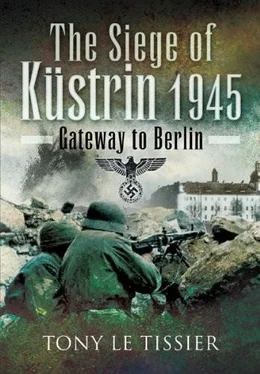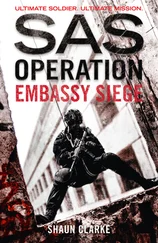Among our vehicles was a furniture van, whose driver had not made the dash in time. The tanks fired at our retreat and there were some dead and wounded, of whom the last could not be recovered for hours until the tanks withdrew.
We assembled at a forester’s lodge deep in the woods behind the front line and waited there until evening.
In the darkness some officers of the unit occupying the position gathered and talked quietly among themselves, completely ignoring us. I wondered about this behaviour, which was contrary to normal army conduct. We also discovered that they had been given orders to withdraw towards Woldenberg. The enemy had apparently broken through north of our position, but it must have been far away for we had heard no sounds of combat. The infantry assembled at about 2200 hours and marched off.
We still sat there! Our troop leader was still looking for the Battalion ‘Schulz’. It was possible that he would not return. Russians, military police or an energetic commander could have arrested him. Meanwhile we had recovered the furniture van that had been stuck between the lines with its engine still running. Its radiator was leaking and had to be provisionally repaired. As the forester’s pump was frozen, some snow was melted on a stove.
In front of us were the Russians, our own troops had vanished, and we were in the middle of a wood with no idea of the place or surroundings. Apart from this, when we moved out that morning, our second gun had driven off with its commander, crew and vehicle and had not been seen since.
Our troop leader reappeared at about midnight. We decided to follow the route taken by the infantry, but soon lost our way in the woods in the dark, especially as the infantry had used footpaths and tracks. Following an adventurous journey with the furniture van and other ‘combat vehicles’ through loggers’ and woodland tracks, at dawn we eventually reached a road with a kilometre stone with an arrow pointing towards Woldenberg and, in the opposite direction, to Driesen. At last we had hit the route to Woldenberg. But from there through the morning stillness came the sound of tank guns. It made no sense for our troop to drive into a rolling tank attack with no idea of the place or the situation. We therefore decided to drive towards Driesen, although it could already have been in Russian hands, as from there it was only a few kilometres from Kreuz, which we had abandoned. On the road to Driesen and in the village itself all was dead quiet. Only a few civilians were standing around, apparently foreign labourers awaiting the arrival of the Russians.
We drove on to Friedeberg, hoping to bump into our own troops. The civilian population had almost completely gone and there was no trace of the army. We stayed all day in Friedeberg. Our anti-tank team looked for a garage as their vehicle was not functioning properly, and one of our men tried to bake some bread in an abandoned bakery.
Finally we needed something to eat. Our troop leader was once more away trying to make contact, and returned that evening. Then the Russians rolled into the town from one side while we left from the other. If I remember correctly, the tanks were firing as they entered the town, otherwise we would not have noticed in time and would have been wiped out.
We drove during the night to Landsberg, always with the feeling that we might be overtaken by the tanks at any moment.
At Landsberg we caught up with the Wehrmacht for the first time and drove into a barracks complex. Mounted troops were deployed on the barrack square, all spick and span, feeding their horses. Everything was peaceful with no sense of the Russian spearheads approaching.
We found a headquarters staff in one of the barracks, reported and asked to be allocated. An adjutant wanted to know all about us, especially from where we had come. When our troop leader said that we had belonged to Emergency Battalion ‘Schulz’, the doubts vanished from his face. That is how one can innocently arouse suspicion of lying. He vanished and we had to wait a long time. We had the impression of being unwanted. We still had the feeling that live firing could begin any moment. It was a strange feeling.
Finally the adjutant reappeared with the order: ‘Drive to—and deploy!’ This was naturally as unmilitary as the withdrawal ‘towards Woldenburg’. The order should have read: ‘Drive to—, report to command post X and deploy in support of their troops.’ I still believe that they wanted to get rid of us and were sending us out no matter where. There was no sign of any defensive organisation.
In any case we had the bad experience of Dragebruch behind us, where we had also been left in the dirt. Instead of driving to—, we drove towards Küstrin, and were not the only ones. The road was full of vehicles. That was on the 30th January 1945.
We reached Küstrin on the morning of the 31st January. We immediately got the feeling of a more orderly establishment. [12]
Also caught up in the Soviet advance were the German civilian refugees from as far away as East Prussia, usually organised in treks, but invariably clogging the roads in their desperation to flee the enemy with their horse-drawn wagons and push carts. Many left their homes too late to reach safety, for the local Nazi Party officials were reluctant to permit their leaving for fear of being branded as defeatists. However, the towns they had to pass through were generally organised to provide overnight accommodation and food before moving them on.
Hans Dalbkermeyer related:
On the 1st January 1945 I was 15½ years old, a pupil in the 5th Class of the Deutsche Heimschule in Birnbaum in the Warthegau. This chain of senior schools educated us up to Arbitur level. We were called ‘Jungmann’, were boarders, and wore Hitler Youth uniform and a narrow armband with the words ‘Deutsche Heimschulen’ on the left forearm. The pupils came mainly from bombed cities or, like me, from the countryside. My parents’ home was in a small village about 30 kilometres east of Birnbaum. Birnbaum itself, a small town of some 15,000 inhabitants, lay 90 kilometres east of Küstrin on the Warthe. From 1919 to 1939 Birnbaum was located just beyond the old Reich boundary on the then Polish side.
The Christmas holidays ended during the first days of January, after which the whole boarding school was back, but only Class 4 and below had school classes. We pupils in the 5th Form and upwards were given warlike organisational tasks in the town. Our 5th Form was still at full strength, but the 6th Form was reduced to half and the 7th Form down to about three pupils, and the 8th Form ceased to exist as they were assigned as Luftwaffe auxiliaries or conscripted into the Wehrmacht.
Our task in the town, equipped with horses and carts, was to do as much as possible for the German people flowing through the town. At first we were dealing with only small and individual groups, but this changed. As helpers for the Red Cross, NSV, Party and other organisations, we distributed food, warm drinks, arranged schools and gymnasiums as overnight accommodation and looked after them. There was much to do from morning to evening, so much that we would gladly have exchanged it for normal school classes. But we had to do our duty.
On about the 20th January the situation became serious and threatening. Russian troops were getting closer and were unstoppable. Wehrmacht units were mixed in with the treks, moving west. There was snow on the ground and the temperature dropped to minus 20 degrees Celsius.
Now schoolwork also ended for the younger classes. A Luftwaffe transport unit moved the school in closed transport, including most of the staff, to Cottbus. From here they went on by train to Thuringia. For us older ones the situation altered for us correspondingly. With the school dissolved, we were attached to the local Volkssturm but still accommodated in the school. The police gave us carbines of all types. In a second issue I acquired one of the desirable short Italian ones. It looked good but often failed later in action. One of my classmates was given among other things a muzzle-loader, possibly from the 1870/71 war, with three rounds of ammunition. We tried it out in a pit behind the school from behind safe cover. From fear of a bursting barrel or false action, we tied the gun to a post and fired it using a long string. A big bang relieved our tension and established that the old weapon still worked.
Читать дальше












